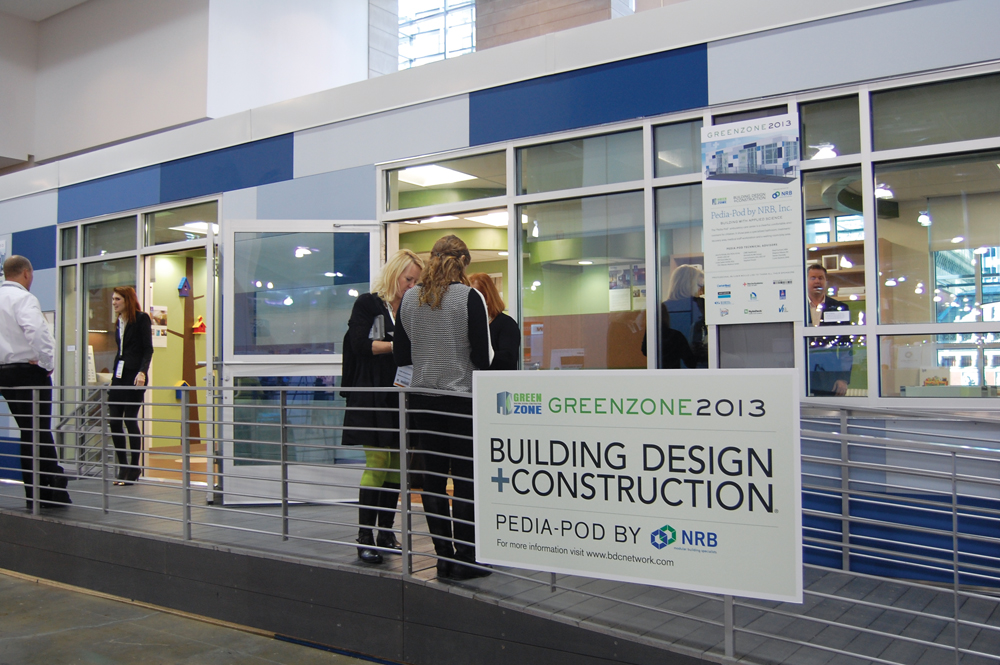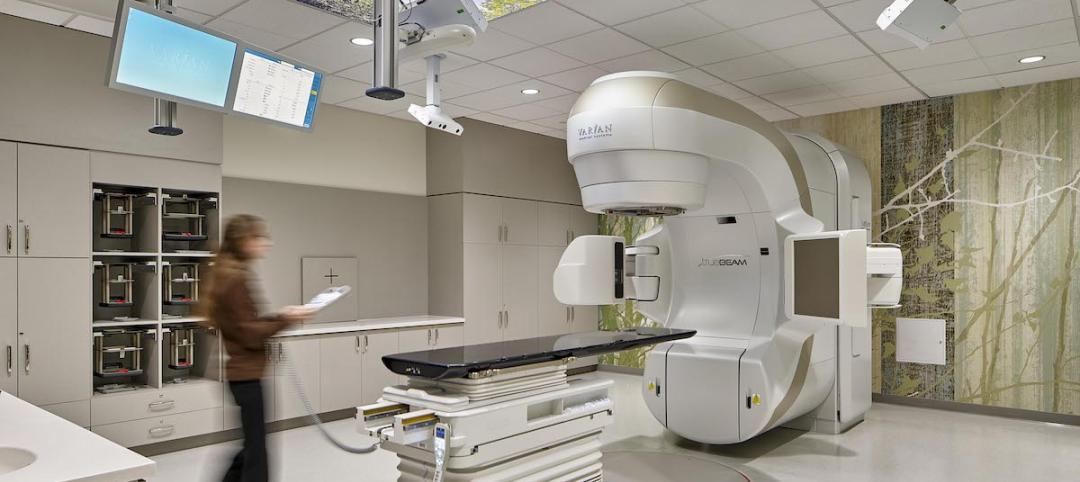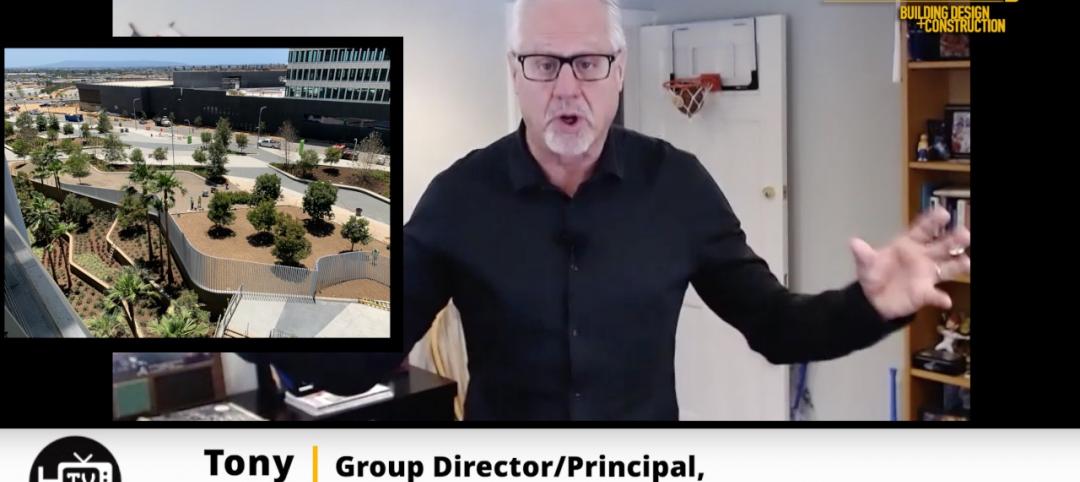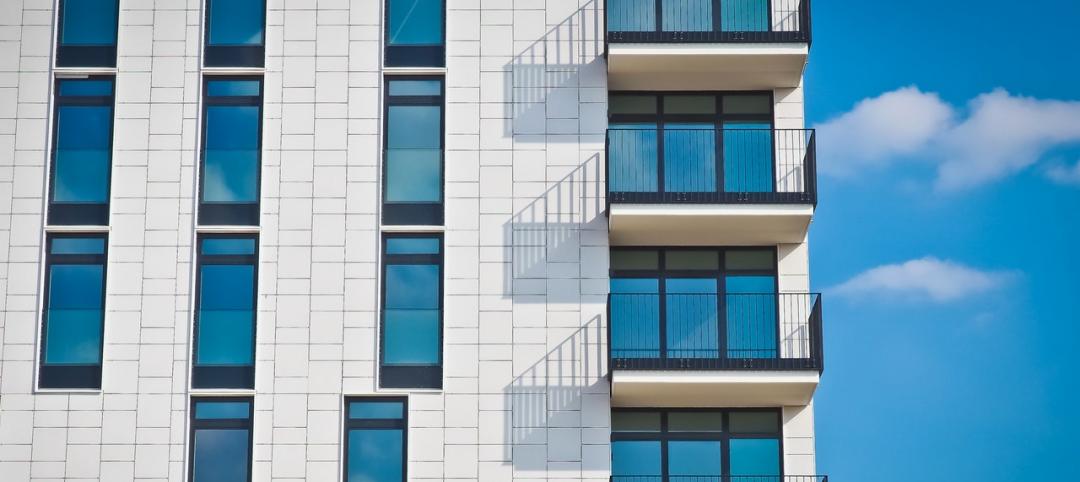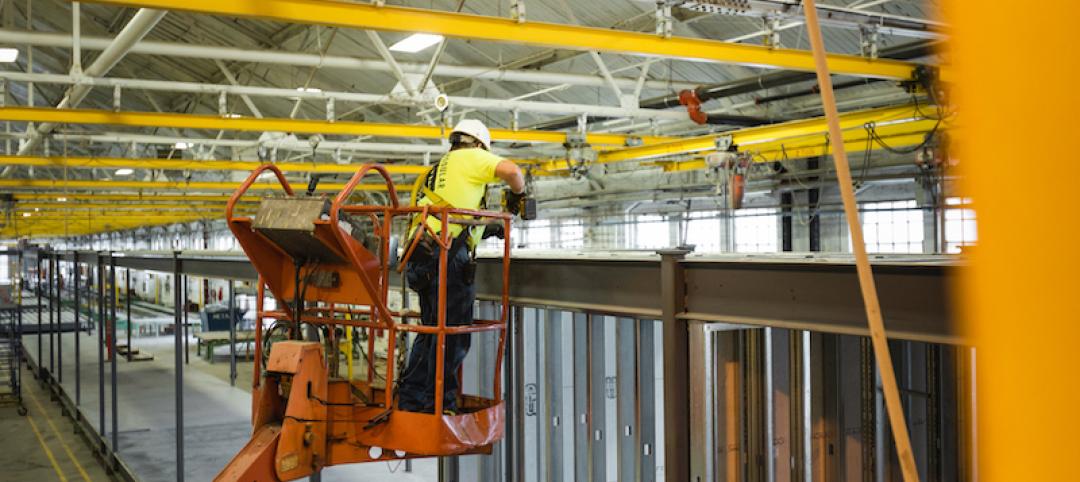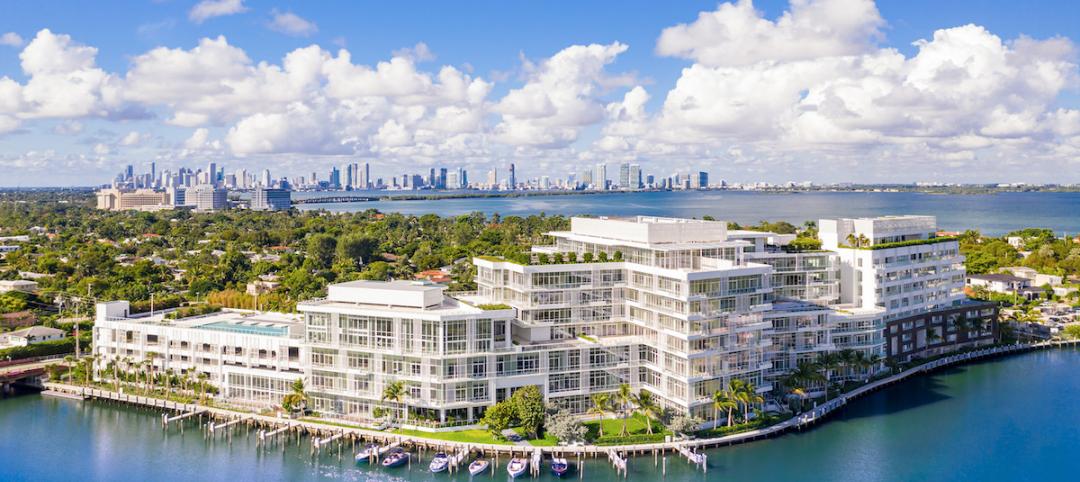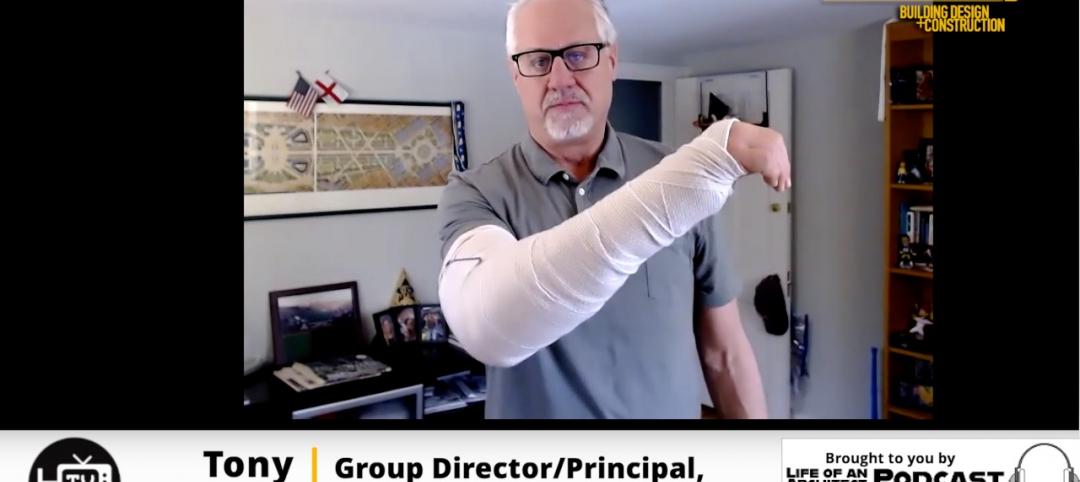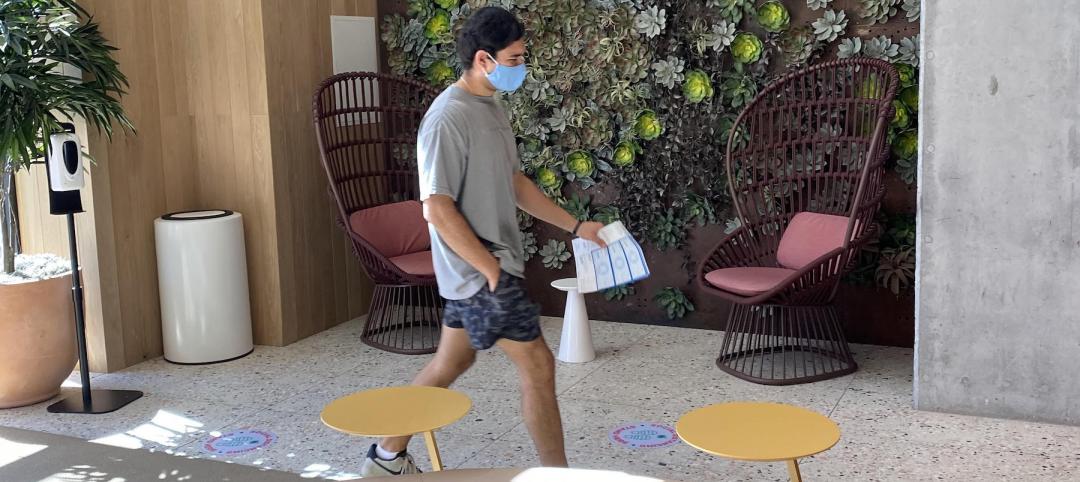Greenbuild 2013 in Philadelphia was the site of a unique display—Pedia-Pod, a modular pediatric treatment room designed and built by NRB (USA) in Ephrata, Pa., in collaboration with the editors of Building Design+Construction, SGC Horizon LLC, and their team of medical design consultants. More than a thousand Greenbuilders toured the modular unit on November 20 and 21 at the Pennsylvania Convention Center, in Philadelphia.
Off-site construction is gaining momentum and recognition within the AEC and building owner community as a viable alternative to traditional on-site construction methods. Pedia-Pod is a blend of architectural form and medical function that is relevant to the specialized, comforting care needed for the treatment of children.
The Pedia-Pod modular concept, with its sustainable design and construction principles, can be applied to many types of healthcare facility needs, from bathroom pods to physician offices, imaging clinics, ambulatory care centers, and even complete hospitals.
GROWING DEMAND FOR PREFAB IN HEALTHCARE
“We’re definitely seeing an increased demand for prefabricated and modular components being used in the healthcare market sector, especially with large hospital bed expansions and critical access hospitals,” said Allen Post, AIA, an architect with Perkins+Will’s Atlanta office who toured Pedia-Pod. “Whenever there is a lot of repetition, such as a patient bed tower with tens to hundreds of bathrooms, headwalls, and ceiling components, or rural area hospitals with a limited local construction labor force, off-site fabrication becomes a viable option.”
Post said that solutions that have the potential to reduce construction time and cost while improving quality and safety are becoming more accepted practices in the healthcare sector. “The Pedia-Pod prototype is an example of what off-site construction can achieve within the healthcare market,” he said.

Pedia-pod’s sofa can be converted into a pull-down bed (green area) for a parent who wishes to remain overnight with a hospitalized child.
Pedia-Pod combines green products with an efficient off-site construction process, creating a high level of sustainability.
Structural steel framing, steel deck, and steel stud infill lend durability to the building as well as a very high amount of recycled content. The building envelope contains closed-cell spray foam insulation with recycled content in the roof and floor, Greenguard-certified sustainable insulation in the walls, a specialized weather/rainscreen barrier, lightweight cement board subfloor, and mold- and moisture-resistant wall sheathing with 95% recycled content.
The structure has a white roof membrane with an SRI index of 99. The exterior cladding is a handsome architectural fiber cement panel containing Forest Stewardship Council–certified wood pulp and fly ash waste from landfills.
A unique interior drywall product actively removes harmful VOCs from the air, while another drywall component attenuates noise; both are moisture- and mold-resistant. The interior paint is a zero-VOC formula, and the floor finish is a long-lasting, slip-resistant product with recycled content requiring no harsh chemicals for cleaning. Millwork contains FSC-certified board.
The building also features high-performance windows, mechanized shades for daylighting control, energy-efficient lighting and controls, and water-saving plumbing fixtures.
“Building off-site in a controlled environment means better waste management, less vehicular travel, and less disruption at the site,” said Don Engle, General Manager, NRB (USA). “Because Pedia-Pod is one module, it was 100% complete when it left the plant. Once in place, it was set up and ready to go in just hours.”
After Greenbuild, Pedia-Pod was shipped back home to Ephrata and “recycled” for display purposes. Building owners, architects, and contractors will soon be able to tour the structure to see the level of complex features, finishes, and building science technology that off-site construction can bring to the healthcare and commercial/institutional construction markets.
For more on the Pedia-Pod, visit: http://www.bdcnetwork.com/greenzone2013/index.html

Mechanized roller shades let daylight in but can be closed with a handheld device from the patient bed for more privacy or less light.

A corner space offers comfortable seating for visitors and family members, plus a desktop area for parents wishing to catch up on work while the child is sleeping. Parts of the walls are covered with a dry-erase paint coating.

Artistic elements add color and ‘positive distraction’ for the child, as recommended by pediatric healthcare experts.

A cutout in Pedia-Pod’s cladding allowed Greenbuilders to see the correct method for installing energy-saving, high-performance vacuum insulation panels, a silicone air barrier system, and structural glazing sealant.

Patient area. Experts Jane Rohde, AIA, FIIDA, ACHA, Linda Gabel, IIDA, AAHID, and CBRE Healthcare advised on the design of the unit.

Last month, more than a thousand green builders toured Pedia-Pod at the Pennsylvania Convention Center, Philadelphia.

The ADA-compliant bathroom features grab bars throughout and an accessible shower.

Energy-efficient lighting/controls provide illumination without disrupting the child’s circadian rhythm.

A convenient desk area offers storage and organization for medical staff, while taking up minimal space.
Related Stories
Healthcare Facilities | Feb 18, 2021
The Weekly show, Feb 18, 2021: What patients want from healthcare facilities, and Post-COVID retail trends
This week on The Weekly show, BD+C editors speak with AEC industry leaders from JLL and Landini Associates about what patients want from healthcare facilities, based on JLL's recent survey of 4,015 patients, and making online sales work for a retail sector recovery.
Multifamily Housing | Feb 10, 2021
The Weekly show, Feb 11, 2021: Advances in fire protection engineering, and installing EV ports in multifamily housing
This week on The Weekly show, BD+C editors speak with AEC industry leaders from Bozzuto Management Company and Goldman Copeland about advice on installing EV ports in multifamily housing, and advances in fire protection engineering.
Healthcare Facilities | Feb 5, 2021
Healthcare design in a post-COVID world
COVID-19’s spread exposed cracks in the healthcare sector, but also opportunities in this sector for AEC firms.
Building Owners | Feb 4, 2021
The Weekly show, Feb 4, 2021: The rise of healthy buildings and human performance
This week on The Weekly show, BD+C editors speak with AEC industry leaders from Brookfield Properties, NBBJ, and UL about healthy buildings certification and improving human performance through research-based design.
AEC Tech | Jan 28, 2021
The Weekly show, Jan 28, 2021: Generative design tools for feasibility studies, and landscape design trends in the built environment
This week on The Weekly show, BD+C editors speak with AEC industry leaders from Studio-MLA and TestFit about landscape design trends in the built environment, and how AEC teams and real estate developers can improve real estate feasibility studies with real-time generative design.
Multifamily Housing | Jan 27, 2021
2021 multifamily housing outlook: Dallas, Miami, D.C., will lead apartment completions
In its latest outlook report for the multifamily rental market, Yardi Matrix outlined several reasons for hope for a solid recovery for the multifamily housing sector in 2021, especially during the second half of the year.
Modular Building | Jan 26, 2021
Offsite manufacturing startup iBUILT positions itself to reduce commercial developers’ risks
iBUILT plans to double its production capacity this year, and usher in more technology and automation to the delivery process.
Multifamily Housing | Jan 20, 2021
Abandoned Miami hospital gets third life as waterfront condo development
The 1920s King Cole Hotel becomes the Ritz-Carlton Residences Miami in the largest residential adaptive reuse project in South Florida.
Multifamily Housing | Jan 14, 2021
The Weekly show, Jan 14, 2021: Passive House innovations, and launching a design studio during the pandemic
This week on The Weekly show, BD+C editors speak with AEC industry leaders about innovations in Passive House design, and the challenges of building a design team and opening a new design studio during a pandemic.
Multifamily Housing | Jan 8, 2021
Student housing development in the time of COVID-19
Despite the coronavirus pandemic, many college and university residences were completed in time for classes, live or virtual. Here are 14 of the best.


